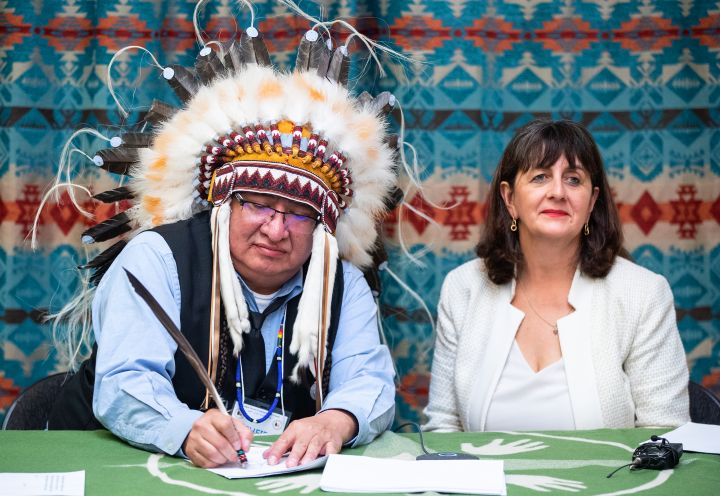A First Nation south of Edmonton announced Wednesday it has signed a deal with the federal government that allows it to run its own child welfare system.

At a news conference in Maskwacis, Alta., Chief Desmond Bull said the Louis Bull Tribe’s two-year deal with Ottawa is a bilateral agreement that does not involve Alberta’s provincial government.
Bull called Wednesday a “historical day” that sees Louis Bull Tribe “exercise jurisdiction over our land.”
Chinenye Anokwuru, a press secretary for Alberta’s chidren’s services ministry, told Global News the province is committed to working with Indigenous people toward reconciliation.
“When the Louis Bull Tribe enacted the Asikiw Mostos O’pikinawasiwin Law and assumed authority over child and family services for their children and youth, the Ministry of Children’s Services worked collaboratively with the Louis Bull Tribe to support transition to their law,” she wrote in an email. “Our top priority was ensuring the safety and well-being of the children and youth receiving supports and those needing placement at that time.

Get daily National news
“To ensure their safety, the ministry provided resources and supports to Louis Bull Tribe including a transitional grant to help with transitioning the files to the Louis Bull Tribe as well as access to information systems to help with the transition process. We also continued to fund the cost of placement for some children and youth, as needed, and made sure they had staff for six months, with after-hour services, office space and equipment at no cost to the Louis Bull Tribe.”
Anokwuru added that provincial officials have been meeting regularly with Louis Bull Tribe officials about the matter.
“Transitional support and funding concluded at the end of September,” she said. “Children’s Services continues to work with the Louis Bull Tribe as part of our commitment to ensuring the safety of all children in care.”
Anokwuru added that while the Alberta government may not be part of the bilateral agreement between Louis Bull Tribe and Ottawa, Alberta Children’s Services “continues to work with the Louis Bull Tribe where necessary, as part of our commitment to ensuring the safety and well-being of all children and youth in care.”
The agreement was possible because the federal government passed a law in 2020 aimed at allowing First Nations, Métis and Inuit people to have more autonomy in providing child welfare services. The legislation is currently before the Supreme Court of Canada.
The legislation allows First Nations to bypass co-ordination agreements with provincial governments if no consensus is met one year after a request.
READ MORE: Report on Alberta girl’s death highlights need for overhaul of child welfare system: advocates
“The Creator has given sovereignty to govern ourselves,” Bull said, noting he hopes the deal will “ensure those generations are brought up immersed in culture.”
In 2021, Cowessess First Nation in Saskatchewan became the first First Nation to sign such an agreement. Wabaseemoong Independent Nations in Ontario and Peguis First Nation in Manitoba have since also signed deals with the federal government and their provincial governments.
“Although this is only a two-year agreement, it gives us the base and the foundation for us to look forward to developing something stronger, something more permanent, something that will allow that bilateral agreement to continue,” Bull said.
In a statement, Indigenous Services Canada said the federal legislation making the agreement possible is meant to give all children the best possible start to their lives, which it said “involves growing up with a connection to community and culture and their best interest always being prioritized.”
“The bilateral agreement signed today with the federal government provides Louis Bull Tribe with $124.8 million over two years to support them as they implement their law and exercise jurisdiction in relation to child and family services,” the statement reads.
“The agreement also establishes jurisdiction transition measures and sets out roles and responsibilities to help make the transition as smooth as possible across Canada and internationally.”
–With files from The Canadian Press










Comments